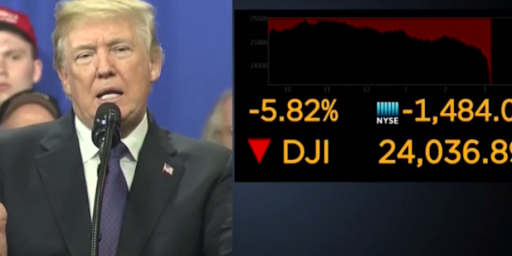The Efficacy of Government Regulation
One of the things that always gets me is the often naive reaction to problems with the market. Typically when there is a problem the first thing we hear is some sort of “the government should do something” or “there should be a law”. But the problem I have is why should we expect the government to come up with a solution? Glenn Reynolds has an interesting example (link to the original article–subscription required).
As the market plumbs six-year lows, China’s 60 million retail investors are an embittered lot — sounding a jarring note amid the capitalist changes transforming China’s economy. The government once touted the nation’s two stock exchanges, started in 1990 and 1991, as founts of opportunity. But they have turned out to be full of rotten companies that relied on political connections to get listed. Regulators have had little success fighting rampant insider trading and poor disclosure.
For the ruling Communist Party, the rage of investors who have lost their nest eggs could be toxic. The party has long struggled to keep a lid on social unrest, especially among unemployed workers and overtaxed farmers. Now a big chunk of the middle class is angry, too.
The problem here is listing companies on the stock exchange that are legitimate and not companies that are basically scams designed to bilk investors out of their money. Further, you aren’t going to get many situations where the government is more involved in the economy than in the People’s Republic of China. So what do we see? Wide spread corruption that could very well lead to considerable unrest in Asia. And I’ll go even further, this problem is most likely worse than we’d see in a country like the U.S.
The reason it is worse is that there is no freedom of the press and the government seeing this as a problem could very well decide to gin up some bravo sierra story about how it is all due to infiltrators from Japan, Taiwan or some other Asian country and that something has to be done. What might be done? Invasion? Start a war to distract people from the real problem.
The problem is two fold. First, if there is a problem in markets it is most likely due to some sort of information problem. Private information can prevent markets from forming or being complete (i.e., efficient). Hidden actions can also prevent markets form working properly or end up being less efficient. The problem of externalities can in some sense be regarded as an information problem. For example, suppose a plant produces pollution in its production process. Ideally, the costs that the pollution imposes on those near the plant (or who suffer from the pollution) should be incorporated into the firm’s cost structure so that it can then be incorporated into the price. The problem is how do you measure the impact of the pollution on the individuals bearing the costs? They are not directly observable, and the person bearing the cost has an incentive to overstate the actual cost. Similarly with external benefits; iIn this case the recipient of the benefit will have an incentive to understate the benefit. So why should the government be better at discerning this private information than the rest of us? Does becoming a bureaucrat for some agency also imbue said bureaucrat with super powers to discern this information? Of course not. The government is in the same position as the rest of us and they have to make what is essentially a guess.
The other problem is that like the rest of us, the bureaucrats are just like the rest of us with agendas, needs and wants. Thus, even without the information problems above there is a question of what exactly is the bureaucrat trying to do? Ideally the bureaucrat would be trying to arrive at the efficient outcome (in economics going from an inefficient outcome to an efficient outcome means that at least one person is made better off and nobody else is made worse off). But is this really what the bureaucrat trying to do? Further, the bureaucrats can only do what the law directs them to do and laws are set by politicians. Politicians are also like the rest of us with agendas, needs and wants. The notion of a benevolent social dictator is a nice and simple way of getting arround problems of how to craft public policy in a theoretical setting, but in practical terms such a being simply does not exist.
Both of these problems create opportunities for rent seeking. Rents are unearned economic benefits. For example, licensing can be a form of rent seeking. If the licensing has one test and is good basically forever, then it will limit the supply and give those with licenses market power (i.e., the ability to set the price higher than with the absence of licensing) and does little to address the information concern (in this case that the license holder meets a certain standard). The higher incomes due to the market power license holders receive is a rent. Now, if the licensing process requires testing for each renewal and keeping up with current methods then the licensing might actually address the information issue. While the price might still be higher than in the absence of licensing, the higher price comes with the added benefit of improved quality of work.
So in answer to the original question: no we shouldn’t expect the government to provide a solution. In fact, I think a good argument can be made that the government does too much. In some cases, the government does very little to nothing to improve the situation or even makes the situation worse. This doesn’t mean there isn’t a role for the government, but that what we currently have isn’t all that good.




